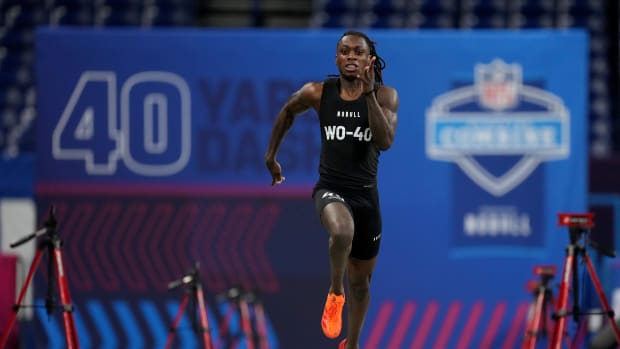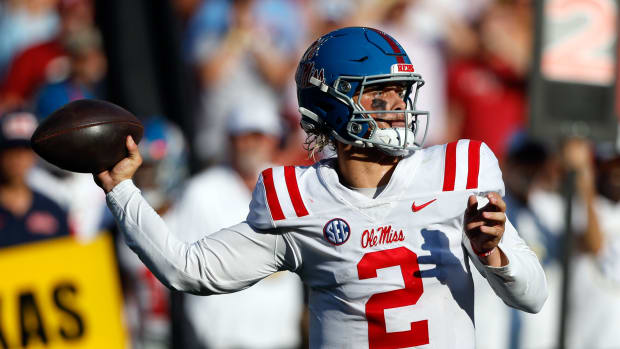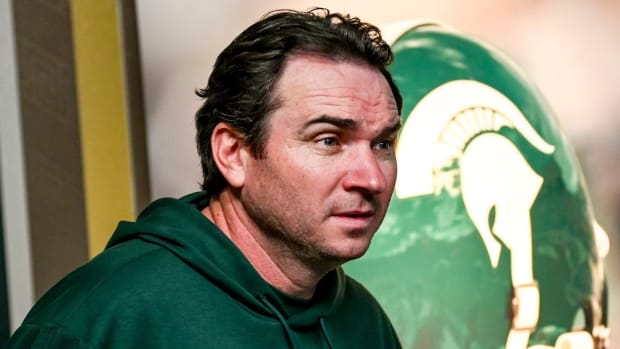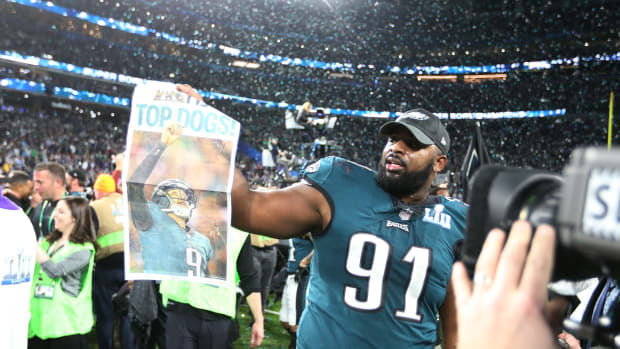How returning kicks taught Washington speedster John Ross to be star receiver
SEATTLE — John Ross III swears it’s true even though it sounds crazy, and borderline unbelievable. But he promises he’s being 100% honest when he says that for years, he didn’t know he could be a good receiver. Seriously.
It does sound at least a tad ridiculous, considering Ross is arguably the most explosive receiver in the College Football Playoff this week, a 5’11”, 173-pound burner who can disappear downfield and then reappear in the end zone, leaving bewildered (and often exhausted) defensive backs in his wake. In 2014, Ross breezed by a Washington State defender then heard that defender shout, from the way behind, “Damn, you’re fast!” as Ross skipped into the end zone.
This season Ross has totaled 1,122 receiving yards and 17 touchdowns, solid numbers for a junior who missed last season with a torn ACL. NFL analysts have compared him to Pro Bowler DeSean Jackson, and he is capable at any moment of turning a routine catch into a spectacular score (or a spectacular catch into a routine score). So it turns out he is a pretty good receiver, and for that evolution he has kick returning to thank.
“It made me a playmaker,” Ross says. “I had so many opportunities to return kicks my sophomore year of high school I realized, hey, I can do pretty good with the ball in my hands—and I can probably do this in college, too.”
We Want Bama? Washington really does
*****
When he corrals a kick return, with the chaos of 11 guys rushing downfield intent on keeping him as far away from the end zone as possible, Ross only has eyes for one person: the kicker. Get past the kicker, he says, and it’s a wave of greenery waiting for you, a simple sprint to the end zone for a surefire score.
“The kicker is the only person no one cares about,” Ross says. “They’re also the most annoying because they don’t tackle well, they just get in the way. I never really know when I’m going to score; I just try to weave in and out of traffic. I look for the kicker because if it’s just me and him, I know I’ve won. Because kickers don’t really know how to tackle correctly.”
Ross has known he was faster than most people since he was blazing past would-be tacklers on his way to the end zone in Pop Warner games. He remembers returning his first kickoff for a touchdown at age 7, playing with Snoop Dogg’s team at an All-Star event on the Lions’ field in Detroit. He fell hard for the jolt of energy that came with it and has been trying to recreate it ever since.
By his sophomore year of high school, Ross realized just how explosive he could be when opposing teams turned the tee as far away from him as possible in hopes that he wouldn’t be able to catch the ball. Ross could often hear opposing coaches yell at their kickers and punters, “Don’t kick it to him!” and point at Ross. That gameplan seldom worked. Everything was fair game at Long Beach Jordan High, no matter if Ross had to drift all the way to the sideline or contort his body to haul in the kick. He had the freedom to do whatever necessary to gain possession. After that “it was off to the races,” he says.
But at Washington, coach Chris Petersen has instilled some basic rules for returns that Ross is still adjusting to: You fair catch if you have to travel farther than seven yards horizontally or if you know your timing will be off (like if you have to drift backwards because you misjudged the flight of the ball). Remember, above all else, that successful returns happen when your teammates are able to block for you, and it’s unfair to ask them to hold a block for a long period of time because the boot wasn’t perfect. Don’t try to be the hero.
“Instinctually, I want to run every time, but college is a different beast,” Ross says. “In high school everyone wants to make the play, so people get out of their lanes and do things they shouldn’t. In college, everything is dialed up to a plan.”
Who will win the College Football Playoff? Making the case for each team
Ross, who has returned a school-record four kickoffs for scores in his career at Washington, studies other experts to improve at his craft. He jokes that he’s his own favorite college returner, but he has a handful of returner idols whom he watches regularly, including Jackson, Reggie Bush and Devin Hester. Ross grew up with current Kansas City return specialist and former Oregon superstar De’Anthony Thomas and got a front row seat to how Thomas would avoid tacklers in returns. “Watching him, it was like he was running around with little kids,” Ross says. “Ridiculous.” Ross observed Bush’s exceptional acceleration after a cut and Jackson’s “I’m not gonna let you tackle me” mentality. He sees how Thomas typically cuts “a lot earlier than other returners, and it scares defenders so bad. He spins them in circles.” Ross tries to mimic that while also recognizing returners’ mistakes. He can pinpoint what makes some returners like Bush and Jackson great but is more interested in what other guys do wrong, like if they misread a hole. He tries to imagine and watch every scenario possible, to see how the best returners get out of bad situations. And he’s always ready to be in his own bad situation.
Ross laughs as he admits that he usually closes his eyes when he’s about to get tackled, a habit going back to childhood. He’s not scared, he insists, but there are a lot of times he braces for impact only to have nothing happen. “I’ll open my eyes, and it’s more green grass and I just think, ‘Move faster! More people are coming!’”
“You can’t tackle him,” fellow receiver and punt returner Dante Pettis says. “You think you have him bottled up and all the sudden, he’s out the other side. He has such good vision, he doesn’t worry about the guy coming full speed. He’s not thinking, ‘How do I make this guy miss?’ He’s thinking, ‘How do I get to the end zone?’”
Pettis, who has taken two punts back for scores and averages 61.2 receiving yards per game, agrees that being a good returner absolutely makes being a receiver easier, if only because math is on your side in the passing game: “Then you’ve only got three guys instead of 11.”
Ross is not happy about the talk circulating in college football coaches’ circles about eliminating kickoffs due to safety concerns. He takes pride in returning kicks, he says, adding that catching the ball in traffic is often more dangerous than a kick return. “Sometimes you don’t know who’s coming, or who’s out of position, who’s been eyeing you the whole time. With kickoff returns, you can see everyone coming.”
He points to the rules Petersen has put in place, saying they’re safety precautions that protect players and possessions. Petersen says everything that might make the game safer needs to be studied, but that numerical data is necessary to back up any rule changes.
Petersen has a long list of what he wants and expects out of returners, both punt and kickoff. He does not subscribe to the theory of sticking your best athlete downfield and hoping they’ll be able to catch and return punts. (Ross returned punts in high school and says he would gladly do so at Washington, too, if asked.) That skill set takes “smart and crafty-type players,” Petersen says. And the skill set for good kickoff returns? “John Ross,” Petersen deadpans. He pauses, laughs, then explains that Ross has “pretty good vision, good courage and he’s fast. That’s always a good combination. The hard thing is, we don’t get many chances. When we do, if he gets a little space, he’s going to get something done.”
Ross returned a kickoff 92 yards in the Huskies’ first game this season, scoring a touchdown against Rutgers in what would become a 48–13 blowout. He has a return routine: While waiting for the kickoff, Ross looks at the crowd to get hyped, then quietly sings “whatever song that comes into my head” to calm himself down. (That day, against Rutgers, it was “Change” by August Alsina.) When the ball is kicked, “it goes quiet in my head, and once I catch it, everything speeds up.” He finds a crease, hits it and is one-on-one with the kicker. Then he makes a move, and he’s off.
*****
The list of John Ross III highlights is long and varied. But he is perhaps best known for his did that really happen? catch against Colorado in the Pac-12 title game.
Late in the third quarter, at first-and-10 on the 19-yard line, quarterback Jake Browning was under pressure and about to be taken down by a Buffalos defensive lineman. Browning managed to get rid of the ball, tossing a pass that looked like it was headed out of bounds for an incompletion. Suddenly, Ross elevated and snagged it with one hand, side-stepped a tackler and sprinted into the end zone. “Ross is a boss!” announcers screamed, as Washington fans and players celebrated, and social media went wild.
On Tuesday in Atlanta, Alabama defensive coordinator Jeremy Pruitt praised Ross’s ability to accelerate after the catch in the passing game, calling him an “instinctive football player.” Minutes after Huskies offensive coordinator Jonathan Smith explained that Ross came to Washington as a “raw” route runner, Pruitt also noted that now the junior, who averages 86.3 receiving yards per game, “runs really good routes.”
Given the hype surrounding Alabama’s defense, it’s easy to make a David-versus-Goliath comparison to Washington trying to score on the Tide. Alabama boasts the best front seven in the country and leads the nation in multiple defensive statistical categories, including total defense (247.8 yards) and rush defense (63.4). If Tide have a weakness, or at least a vulnerability, comparatively, it’s in the passing defense, where they rank 15th nationally, giving up 184.5 yards per game.
How a fraternity helped turn Alabama’s Reuben Foster into nation’s best linebacker
No Alabama opponent has scored on a kickoff return this season, and the Tide give up just 21.6 yards per return. But Ross has a habit of getting into the end zone in the postseason. In 2014, as a sophomore, he scored on a 96-yard kickoff return against Oklahoma State in the Cactus Bowl. (Ross did not record a reception in that 30–22 loss, in which he started at cornerback and notched two tackles.) But that’s actually not his favorite return moment.
“I don’t think people understand how fun a return is, especially an opening return,” Ross says. “It’s an opportunity for you to spark the game. In 2014 we played Stanford, and I ran the opening kickoff back. Unfortunately it was called back [because of a penalty], but the energy that day … I’ve never had a moment where, in the moment I’ve been thinking, ‘This is amazing!’ I did then.”
Perhaps scoring on a kickoff return against the defending champs in a national semifinal could exceed the energy of that return against the Cardinal. It could also get Ross used to reaching the end zone, potentially setting him up for a big day with Browning. If that happens, Ross’s return skills could lead to one of the biggest postseason upsets in modern college football history.




